- Home
- Brian Hodge
Just Outside Our Windows, Deep Inside Our Walls Page 2
Just Outside Our Windows, Deep Inside Our Walls Read online
Page 2
“Why can’t I just bring it over under my clothes?” she said. “What are your parents going to do, search me?”
No, I told her. She’d never get through. I never had visitors, except for the governess, and there were locks. Besides, the paper may have come from downstairs, but it belonged to the upstairs world now. It could never go downstairs again.
But I had a dart gun, the kind with the suction cup tips. And I had string. And Roni found some rope, a little thicker than twine, that she could tie to the string I shot over. And a wicker basket her aunt no longer used in the garden, whose handle she could slip the rope through. By the time it got dark, I’d used the string to pull the rope back, first one end and then the other, and we’d looped it around our bedframes, like pulleys. I tied the ends together with one of the best knots I remembered from scouting, when they still used to let me go out, and then all we had to was keep the handle from slipping along the rope and we could pull it back and forth, from room to room, all we wanted.
That’s how she sent me the paper.
It took me even longer to touch this than it did the pencils. I knew I’d be up half the night, finding the best possible hiding place for it. Nobody could know. Nobody could ever know. If they found this, I’d never have a window again, just walls.
“Hey,” she called over after the sky had gone dark, and she hadn’t seen any sign of me for a while. “You have to tell me why. What did you do? Draw a bunch of dirty pictures once and it fried their brains?”
I leaned on the sill for a long time. In her window, she was a silhouette, a mystery lit from behind, and if I’d been a little older then, I might have wanted to draw every single strand of hair that cut the light into ribbons. She’d done the kindest thing for me that anyone ever had, and we’d never even been in the same room, or closer than twelve feet.
“Sometimes I draw things and they come true,” I told her. Because she’d asked, and I had no one else to tell and couldn’t imagine a day when I ever would. “Sometimes I draw things and it makes them happen. Or makes them change.”
She didn’t say a word. Liar…I might’ve expected that. Might’ve even hoped for it. The longer the silence, the more I wished she’d just make fun of me. My fingers hung onto the windowsill the way bird claws hold branches.
“You’re not going to go away now, are you? You’ll still come to the window?”
“It depends,” she said.
“On what?”
“How does it work? Do you just draw anything, and whatever happens, happens? Or do you have to want it to, first?”
“I think I have to mean for it to. Even if I don’t know that at the time.”
And even if I wanted it to happen, sometimes nothing did. Otherwise, the park would’ve been full of T-Rexes and a brontosaurus herd. Which had made me think I was limited to working with what was there already, not making something out of nothing.
“Interesting,” she said. “Listen. They tell me I’m going to have to have braces starting next year. The last thing I want is a big shiny metal mouth. If I gave you a really good look at them, do you think you could fix my teeth?”
* * *
I’ve always wondered what her dentist would have said if he’d ever gotten a chance to see her teeth again.
It wasn’t a hard thing to do, and I was able to get a closer look at her mouth than she expected, because I had a telescope, all the better to see everything on the earth and sky I was missing. Roni stood in her window and smiled a wide, crazy smile, and I let it fill the telescope’s eyepiece, and first drew her teeth the way they were, how the ones around the side tilted in and one in the front overlapped the other. Then I concentrated really hard and started changing the lines a little at a time. Twice she said it hurt, but didn’t want to stop.
After we were done, it took a while before she came back from the bathroom mirror. But she said I’d done a good job.
It wasn’t the first time I’d fixed something, and I was better at it by now than I was before, when I was smaller and my fingers didn’t move as well, and this was all new to me, and something my parents didn’t understand. All I’d done until that time was little things around the house, like switch the arms and legs on a dancing figure that spun around on top of my mother’s music box. They never suspected, not until the night they had a party, for Christmas, I think, and they marched me around to all the guests, and had me show off things I’d drawn so everyone could see what a great artist they had here.
One of the guests asked me to draw his portrait.
So I did.
Except I drew him the way I wanted him, because I didn’t like him. He was loud and his breath stank and he spit when he talked and it hurt my ears to be around him, so first I drew his ugly flapping mouth, and then I smeared it out, and his eyes, too, to stop him from looking at me the way he was starting to.
That changed the party in a hurry.
My parents figured things out, finally, and made me put him back together again, but I was scared by then, and didn’t draw as well, and it was the first time I’d tried to make anything the way it was before. A few days later, when I was eavesdropping on my parents as they argued about what to do with me, I heard them say the man was going to be having surgeries for years.
So it was good to help Roni.
But there wasn’t much else that needed changing, so the rest of the time I just drew without any other reason behind it, mostly other places I would rather be, if only I knew how to get there.
* * *
The school year ended for everyone but me, and summer got hotter. Whenever I wasn’t having lessons and Roni wasn’t somewhere else, we lived at our open windows, so our top floors got warmer, too, and we wore the windowsills smooth with our elbows.
Plus we’d never taken down the rope.
“Do you think we should?” I asked one night.
“No. Definitely not,” she said. “They never paid any attention to what’s going on over their heads before, so why would they start now?”
So we used the basket to pass stuff back and forth, like books and magazines and comics and music and other things we liked, plus things we made. I sent her drawings, some to keep, and she sent me some stories she was working on, not only to read but for me to draw pictures for them.
She admitted they were all set in the place where the songs came from.
Roni had never stopped singing after that first night. I was glad of it, and by now she didn’t seem to mind if I heard or not. I still didn’t understand the language, and she wouldn’t tell me what the words meant, but I began imagining what they must’ve been about from the sound of them. And from her stories, which I did understand. These were mostly about girls who killed trolls and ogres, or held them captive forever, or held them captive awhile and then killed them. At first I felt sorry for them, because as a fellow prisoner I knew what they were going through, but then I realized each one of them had done something terrible to the girls, so it was probably for the best when the princesses and peasants and warrior girls started by cutting off the monsters’ hands.
Then, one evening, when the sky was soft and purple and fireflies flickered close to the ground, she peered at me with her head cocked at a curious tilt. “It was you, wasn’t it?” she said. “Those people in the park, in the winter. You did that, didn’t you?”
I’d been waiting for this for weeks. “I didn’t mean to. It was an accident.”
“Three different times it was an accident?” She laughed the way you laugh when you don’t believe something, but didn’t sound mad. She hadn’t known them, so what was it to her if their heads had come off. “How did you do it without paper?”
I asked if she ever had known what it was like to want to do something so bad, only not be able to, that you thought you were going to explode. She didn’t have to think about it. Well, that was me without paper. Until I’d noticed a layer of frost on the inside of the windows overlooking the park.
“All I did was lo
ok through the glass and use my fingernail to scratch an outline around them.” And then flick my fingernail across their necks. “I didn’t mean anything. The first time I didn’t even know it would happen.”
She looked confused. “When I first asked you how it worked, you told me you did have to mean it.”
Right. I had. So maybe I was mad at the people for being able to be out while it was snowing and I had to stay inside. Maybe I’d done it the second time to make sure the first was really my fault. Maybe a third time just because I could. Mostly I remembered the way they fell, first one part and then the other, straight down into the snow without any sound.
“Is it something you’ll always be able to do?”
“I guess so,” I told her. “But I heard my parents talking once and they were wondering if I might grow out of it someday.”
She nodded, very solemn, very serious. “I have to think about this.”
“Are you mad at me?”
But she was already gone from the window. I still heard her voice, though, and it gave me hope: “I’ll never tell on you, if that’s what you mean.”
* * *
Later that night I was awakened by the basket clunking at the window. I turned on a light, the only light burning in the whole world, and got out of bed to see what she’d sent me. It was a picture, Roni and two boys, one obviously older and one who looked younger, plus a woman and a man. Roni wasn’t smiling, at least not so you could see her teeth and whether any of them were crooked or not, and I sort of remembered what it was like, having to pretend to smile that way.
Her voice was a whisper now, floating like a mist across the space between our rooms.
“If someone was going to come over, and I told you what time, and you knew who to look for, and you saw him, could you do it then?” she said. “The trick with the head?”
I rubbed my eyes and looked at the picture some more. “Who to?”
She made a sound I’d never heard. “Don’t make me say it.”
A little later I turned out the light because maybe it would be easier on her that way, and I listened to her breathe and leaned in the window in the moonlight so she could see I would stay there for as long as it took.
“The one in the middle,” she finally said.
* * *
It was early August when I heard her crying. I didn’t even know she did that, because she seemed very much older to me, twelve or maybe as old as thirteen, and I thought nothing could get to her that bad any more.
I suppose I’d always been afraid that all of this would only be for the summer, or a year, anything but forever, that it was too good to last. I’d made a friend and so had she, and as far as I knew, no one else in the downstairs world was even aware of it, and this was just the way we liked it. But tomorrow she would be going away again. They would be coming to pick her up and take her home again.
“Nothing will change there,” she told me. “They say it will this time, but I know it won’t.”
It was a long time before I understood what she really meant by that. At the time, all I knew was that it meant a lot to her, meant everything to her.
“You could come over here,” I said. “I’ll hide you.”
She laughed through her tears. It had been a long time since I’d heard it, the you’re-such-an-idiot laugh. “You don’t think your parents will notice me down there looking for the keys?”
“That’s not how I mean. Just come across. Like we did with the paper and everything else.”
“On the rope? It’ll never hold me.”
It could. I was very sure of this. I told her how it could.
I didn’t mean for this to make her cry even harder, but it did.
I stayed awake the rest of that night, pinching myself whenever I got sleepy, in case Roni changed her mind. It was kind of fun, because I hardly ever got to see the sunrise, and now I had a reason, something important to do for once.
“Okay,” she said when the sky was first beginning to go pink and orange. “I think I trust you.”
We started with her legs.
Had I ever drawn anything this carefully before? Never. Never in my whole life.
She tied each one to the rope by the ankle, and once I‘d pulled them across I unfastened them and rested them side-by-side on my bed, toes up, the way they’d be if she were lying there whole, and I never knew she had a birthmark the size of a quarter on one thigh.
Now we had to start planning more carefully, because once we did the first arm, she wouldn’t be able to tie things very well with just one hand, so she had to start tying parts of herself to the line ahead of time. The last thing she did was lean over to one side with her head in the basket and wait for me to take care of the rest.
After I had all her parts laid out in place I thought of my assistants, my human spiders, and how happy we made the audience and how loudly it clapped for us. I really wanted to try it, except Roni hadn’t agreed to this, and probably wouldn’t like it, and I could see how impatiently her head was staring at me from the pillow.
So I just drew her back together again like normal.
“What did it feel like?” I wanted to know. “Did it hurt?”
“Not much.” She thought awhile longer. “Cold, though. It felt cold.” She looked around at all the space I had, a whole floor to myself. “This is nice. This is really, really nice.”
We cut the rope and pulled all of it over, then cut it into little pieces so she would never have to go across again. Some of the pieces we threw out the window, down to the ground and up on the roof, and the rest we hid. I knew where to hide anything.
I knew where to hide her when they brought breakfast up, and we shared it even though it wasn’t enough for two of us. I knew where to hide her when the governess came, so she could listen without being heard. I just wasn’t sure where to hide her if anyone really came looking. And they would, I was sure of it. It wouldn’t matter that there were locks on the door at the bottom of the stairs. They’d still come looking. Because they knew there was something different about me.
But for as long as it lasted, it was the best day of my life.
In between the fun stuff, we kept watch at the window, and listened, and late in the day a car stopped in front of the house next door. People got out and I recognized them from the photo she’d sent me, including the one in the middle.
I held up paper and a pencil. “Do you still want me to? The trick with the head?”
We watched them walk closer, and I was glad all over again that I wasn’t a girl, because I couldn’t ever imagine myself looking that confused over a simple question.
“No,” she finally whispered. “I couldn’t really do that.”
I sort of remembered what that was like.
It was less than an hour before they came, but before then we heard people calling outside and watched them troop over to the park and back again. Eventually the doorbell rang downstairs, big bonging chimes you could hear all the way up here.
It was time.
And I knew where to hide her now. It could work. I was very sure of this. I told her how it could, and this time she didn’t cry.
I drew myself first, getting everything just right because this was the trick that mattered most of all. Then I waited while we looked at each other, because I knew now that I loved her, even if I didn’t know as what, and there was nothing more to say, just listening for the voices and footsteps to get closer, until the keys began to click in the door, and Roni closed her eyes and nodded.
Back to the paper, concentrating very hard, blocking out everything else.
I drew her inside me.
And when I looked up again she was gone.
* * *
That was a long time ago, in a house I hardly remember, except for every square inch of the top floor, and the views. The house isn’t standing anymore.
But we’d pulled it off, waiting there innocent while they looked for her. It wasn’t as if they had to tear the place apart. Ev
en with an entire third floor to search, there are only so many places something the size of a person can hide. I think they were a little afraid of me by this time, too. There’s what you know, and what you suspect, and what you don’t know, and they realized what they didn’t know was the biggest part of it, and so they must have decided it would be safer not to grill me too hard.
Inside, I could feel her moving, but later on she went to sleep, the way you can sleep when you’re with someone you trust.
We waited a long time, weeks and then months, for the search and suspicions to die down.
“Aren’t you ready to come out now?” I’d ask every so often.
“Just a little longer,” she’d tell me. “This is nice. This is really, really nice.”
Never in a hurry. So I asked less and less often.
Until there was no point asking anymore.
Of all the things my parents were wrong about when it came to me, why did they have to be right about this one: that the thing with the paper was something I’d grow out of someday. I don’t even know when it happened. It just did, and while whatever I put down on paper looked better than ever, it just sat there doing nothing, empty and lifeless and inert.
By now I must have gone through forests of trees, trying to remember what it was like, to recapture what once seemed so easy, so I could draw her back out of me again. But the results are always the same. One more crumpled wad of paper, one more curl of ash.
Yet still, she’s close, so close I can almost touch her.
But now her voice comes from so far away.
About The Author
Called “a spectacularly unflinching writer” by Peter Straub, Brian Hodge is the author of ten novels, close to 100 short stories, and three collections of short fiction. Recent books include his second crime novel, Mad Dogs, and his upcoming fourth collection, Picking The Bones. This is scheduled for a fall 2010 release from Cemetery Dance Publications, and includes the award-winning story “With Acknowledgments To Sun Tzu.”

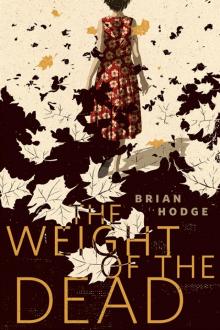 The Weight of the Dead
The Weight of the Dead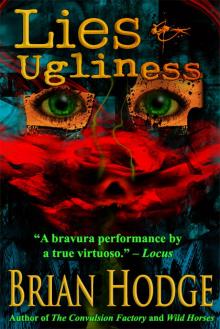 Lies & Ugliness
Lies & Ugliness The Convulsion Factory
The Convulsion Factory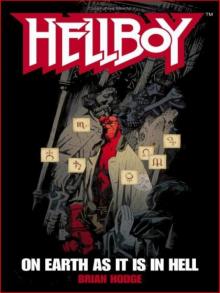 Hellboy: On Earth as It Is in Hell
Hellboy: On Earth as It Is in Hell Whom the Gods Would Destroy
Whom the Gods Would Destroy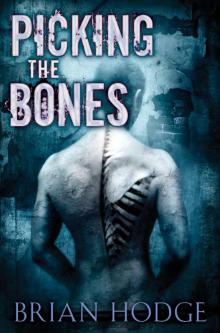 Picking the Bones
Picking the Bones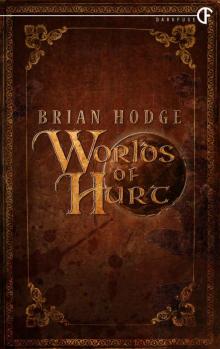 Worlds of Hurt
Worlds of Hurt Oasis
Oasis Nightlife
Nightlife The Darker Saints
The Darker Saints Just Outside Our Windows, Deep Inside Our Walls
Just Outside Our Windows, Deep Inside Our Walls A Haunting of Horrors, Volume 2: A Twenty-Book eBook Bundle of Horror and the Occult
A Haunting of Horrors, Volume 2: A Twenty-Book eBook Bundle of Horror and the Occult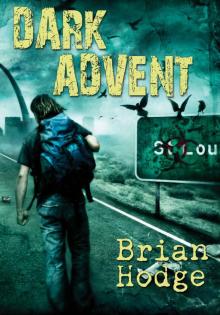 Dark Advent
Dark Advent Mad Dogs
Mad Dogs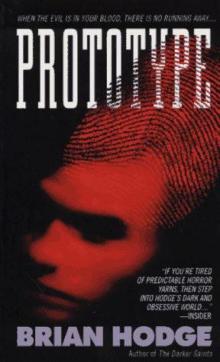 Prototype
Prototype Deathgrip
Deathgrip Falling Idols
Falling Idols